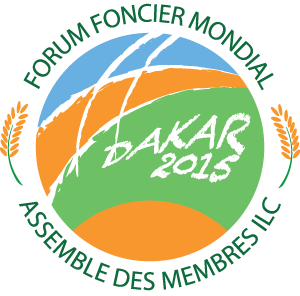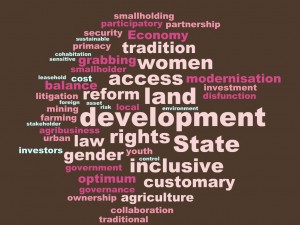 |
MINISTERIAL ROUNDTABLE: AFRICA DAY… |
As might be expected in a series of addresses by ministers and senior bureaucrats, the initial speeches were filled with the usual rhetoric of inclusion, participation, decentralisation, non-discrimination and the importance of ‘multi-stakeholder land governance task forces’. In these there was little explicit attention to the fundamental conflicts that underpin all land reform efforts: not only conflicts between smallholders and ‘land-grabbers’ but the more everyday (though crucial) conflicts between landowners and land users, pastoralists and agriculturalists, women and men, young and old. In one opening address, conflict was euphemistically referred to as ‘dysfunction’ in the land system.
In policy-focused discussions of land reform such as this, you are sometimes left with the impression that landproblems in all African countries are basically the same. This is largely because the reforms pursued (and promoted by donors) are, on the whole, similar across the continent. Yet this obscures the degree to which land challenges are distinctive and unique in each country, rooted in diverse pre-colonial, colonial and postcolonial histories as well as hugely varying ethnic compositions, population pressures, natural resource bases and levels of urbanisation.
If the opening addresses tended to reflect the generic and depoliticised aspects of the land challenge, this soon changed as the dialogue became looser and the Senegalese chair (and audience) made a series of interventions. The minister from Madagascar was refreshingly upfront about the political character of land. He began with a local saying that ‘he who controls land controls power’ and later engaged head-on with the problem of conflict between agriculturalists and cattle-herders. He spoke of the ‘visceral’ and ‘extraordinary’ attachment to land, and the tension between this and the need to ‘modernise’ agriculture.
The sense of a rather awkward dichotomy between land as being something ‘for the people’ and land as a tool ‘for development’ ran throughout the discussion. What definition of development is implied by this dichotomy? Clearly, it seems, a definition more or less synonymous with economic growth. Similarly, there was talk of a tension between people’s customary use rights over land and what was referred to several times as ‘real rights’ (for agribusiness). Infographic illustrating key themes discussed in the ministerial roundtable on 12 May
Infographic illustrating key themes discussed in the ministerial roundtable on 12 May
The idea of reform as a tool for turning land into ‘real’ property (or indeed ‘real estate’) is heavily indebted to Hernando’ de Soto’s ideas, so beloved by donors, about the importance of legally-enforceable property rights to bring about development. It is interesting in this regard to reflect on the shift within the ILC’s discourse over its 20-year history from a language of dignity and empowerment to an increasing concern with ‘security’ of land rights. Security is clearly vital – but we should always question what exactly we mean by security, and bear in mind that increasing the security of one group of interests can often reduce the security of another.
The fact that speakers acknowledged the tensions between the actual land concerns of most people and the dominant donor-supported, legalistic and individualistic ideas about property rights is a positive development. There might not have been such open engagement with this problem ten years ago. Many of the land reforms under discussion were from the early 2000s, when the influence of de Soto was at its peak, but today it was clear that all these government representatives recognise that having ‘good’ formal land institutions is not enough to address the huge challenges of rural (or indeed urban) development.
What needs to follow from this is a broad, open discussion about the range of societal understandings of land ownership, land rights and land security – which can mean very different things to different people – and what this implies for land justice. Hopefully this is exactly what the next two days of the ILC forum will provide.
AUTHOR: Tom Goodfellow, University of Sheffield

